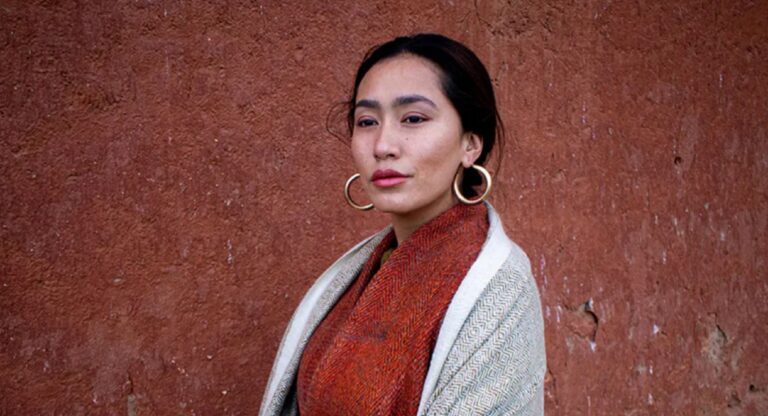Looms of Ladakh, a cooperative in Ladakh, exemplifies the entrepreneurial spirit of more than 450 women from 16 villages to bring their exquisite Pashmina craftsmanship to a global audience and in process showcases the transformative potential of cooperative societies.
Introduction:
In the remote and rugged landscapes of Ladakh, a unique cooperative of women has been weaving success stories, one thread at a time. Looms of Ladakh, a Pashmina farm-to-fashion collective, stands out as a shining example of the transformative power of cooperative societies and women’s collectives in uplifting communities and securing livelihoods.
SahkarNet explores the journey of Looms of Ladakh, highlighting the essence of cooperative societies, the strength of women working collectively, and the profound impact on the lives and livelihoods of the women involved.
The Birth of Looms of Ladakh:
Looms of Ladakh was born out of the vision to empower local women and promote the rich tradition of Pashmina weaving in the region. In a terrain where harsh weather conditions and geographical isolation often pose challenges to economic sustainability, this cooperative has emerged as a beacon of hope.
Looms of Ladakh represents a rural women’s cooperative movement dedicated to nurturing Ladakh’s textile cottage industry. The farm-to-fashion initiative aims to honor and acknowledge the communities involved in raising pashmina, yak, sheep, and Bactrian camel wool.
Concurrently, the cooperative strives to empower local women by providing employment opportunities, allowing them to develop skills in crafting organic and designer products. In doing so, Looms of Ladakh not only supports these women financially but also contributes to the gradual growth of Ladakh’s textile industry for future generations.
Cooperative Society: A Catalyst for Community Development
Established as a cooperative society, Looms of Ladakh operates on the principles of shared ownership, democratic decision-making, and mutual support.
The society exemplifies the cooperative model, where women from the region come together to collectively manage the entire Pashmina production process – from farming the goats for wool to crafting exquisite garments. The cooperative structure ensures that profits are shared among members, fostering economic equality and resilience.
Women Collective: Weaving Dreams and Empowering Lives
At the heart of Looms of Ladakh is a diverse group of women, each contributing their skills and expertise to the cooperative. Through shared responsibilities and collaborative efforts, these women have not only mastered the art of Pashmina weaving but have also become active participants in decision-making processes. The cooperative has become a platform for skill development, fostering a sense of pride and ownership among its members.
Impact on Livelihoods:
The success of Looms of Ladakh has had a profound impact on the livelihoods of the women involved. By directly engaging in the entire value chain of Pashmina production, from farming to fashion, these women have gained financial independence and a sustainable source of income. The cooperative’s model ensures fair wages, empowering women to support their families and invest in education and healthcare.
According to Abhilasha Bahuguna, the Co-founder and director, weavers typically earn an average of Rs 15,000 per month, while those involved in dyeing earn around the same amount. Tailors, on the other hand, can earn up to Rs 18,000 monthly. However, spinners and weavers tend to earn less due to spending less time on the process, often opting for construction work on roads.
Moreover, Looms of Ladakh has played a crucial role in preserving and promoting the traditional art of Pashmina weaving, passing down these invaluable skills to future generations. This not only secures the cultural heritage of Ladakh but also opens up avenues for economic growth through the promotion of locally crafted Pashmina products.
The Market Reach:
Looms of Ladakh has a flagship store in Leh and is available at select Taj Hotels in Mumbai, Shimla, Delhi, and Bengaluru. Additionally, its products are sold at the Oculus Store at the World Trade Centre in New York, and the cooperative is actively seeking other international buyers.
The cooperative recently introduced a social initiative label called Perak, focusing on lower-end apparel. This initiative aims to provide its members with a sustainable source of livelihood, fostering the development of a cottage industry. Perak serves as a stepping stone for members to enhance their skills, particularly in crafting luxury garments. Plans are underway to launch Perak on e-commerce platforms such as Okhai, Amazon, and Myntra, adding to Looms of Ladakh’s approximately 25 SKUs.
In a significant development, the cooperative received the Swavalamban Challenge Fund from the Small Industries Development Bank of India (SIDBI). This fund is instrumental in supporting the development of an ERP system, enhancing traceability and transparency in the production process while boosting overall efficiency.
Furthermore, Looms of Ladakh is set to launch a capsule collection with Royal Enfield on November 15 in Mumbai, featuring small knits and tailored garments. The cooperative is actively engaged in research and development efforts related to yarn and pricing strategies to attract a broader audience. Beyond these initiatives, Looms of Ladakh has garnered support from the Indian Army and ICICI Bank.
Conclusion:
Looms of Ladakh stands tall as a testament to the transformative potential of cooperative societies and women’s collectives in fostering community development and empowerment. The success of this Pashmina farm-to-fashion collective not only highlights the resilience of women in the face of challenges but also serves as an inspiration for similar initiatives worldwide. As the cooperative continues to thrive, it not only weaves exquisite Pashmina garments but also weaves a brighter, more empowered future for the women of Ladakh.



